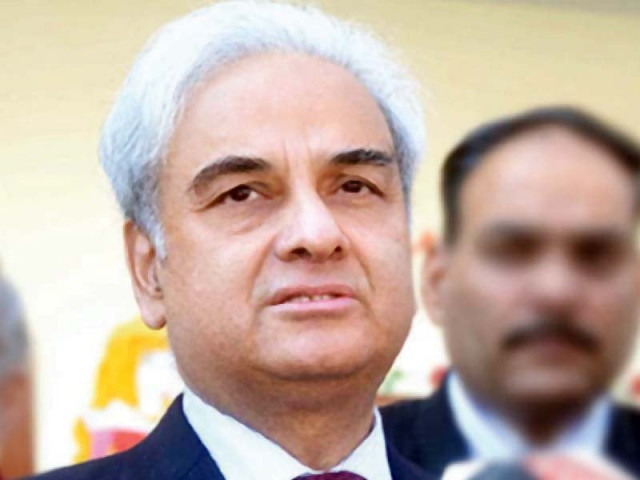Justice Mulk's appointment hailed
CJ Mulk was not in favour of media publicity and did not pick up populist causes highlighted by the media

Nasirul Mulk. PHOTO: FILE
Justice Nasirul Mulk, known as an ‘English’ judge, is famous for his adherence to the policy of judicial restraint which is widely supported by the legal fraternity.
“After decades we have a good chief justice of Pakistan,” senior lawyer (late) Asma Jahangir had said on Justice Mulk’s appointment.
During his tenure as the country’s chief justice, he did not initiate any suo motu proceedings. After his retirement, lawyer Raheel Kamran Sheikh asked Justice Mulk as to why he did not take suo motu notices. To this, the former CJP responded that if a judge takes suo motu notice, it means that he has already decided to move in certain directions and cannot act impartially.
One of the country’s top lawyers, Makhdoom Ali Khan, who closely observed Justice Mulk’s over two decades career, believes him to be the best choice for the caretaker prime minister.
But Khan adds: “Justice Mulk is a decent man and this is not a decent job. I hope he comes back head held high.”
Tenure well served: CJ Nasirul Mulk retires after eventful stint
Another lawyer, Khawaja Haris, also hails Justice Mulk’s appointment. “He has nothing to lose but his reputation. I believe that he will preserve it,” he says.
“Justice Mulk is soft spoken but he is iron willed; no ostentation, no frills – just plain focus on job at hand,” says the senior lawyer.
During his short tenure as the CJP, Justice Mulk handed down four landmark judgments, which strengthened democracy in the country.
Senior lawyers appreciate his role during the 2014 sit-ins by the Pakistan Awami Tehreek (PAT) and the Pakistan Tehreek-e-Insaf (PTI) on Constitution Avenue in Islamabad. At that time, the judges were spending summer vacations in their home stations. However, Justice Mulk cancelled vacations and called on judges at the SC Islamabad registry.
He headed a five-judge bench which on August 15, 2014 passed the order whereby all state functionaries were restrained from taking any extra-constitutional steps.
Former CJP ready to handover bulletproof car after IHC order
Justice Mulk also headed the bench that rejected the plea to disqualify then prime minister Nawaz Sharif for lying on the floor of the National Assembly.
He, along with two other fellow judges, accepted the task of probing rigging claims in the last general elections and headed the judicial commission for the purpose.
All major parties had praised his conduct during the proceedings of the inquiry commission. After spending 86 days, the CJP had rejected the rigging allegations.
Justice Mulk was among seven judges who had passed restraining order against the November 3 emergency and the Provisional Constitutional Order (PCO). He was also among those judges who had refused to take oath under the November 3 PCO in 2007.
The former chief justice also gave an 88-page judgment in the 18th and 21st amendment case. In the verdict, he declared that Parliament has the authority to bring any constitutional amendment, which cannot be challenged in any court of law.
From March 2009 till the end of 2013, ex-CJP Iftikhar Mohammad Chaudhry had adopted the policy of judicial activism. This became the source of confrontation between the superior judiciary and other state institutions – including the executive, the legislature, the election commission and other government departments. Unlike ex-CJP Iftikhar, who was accused of meddling in government affairs, Justice Mulk’s term was credited with adopting the policy of judicial restraint.
He also reversed the former chief justice’s verdict in the Khawaja Asif case, wherein the federal government’s power to appoint heads of different state’s departments was encroached upon.
He had also written a dissenting note in the Mukhtaran Mai rape case and opposed the acquittal of accused in this matter. In 2012, he was heading the seven-member larger bench which had convicted former prime minister Yousuf Raza Gilani for not writing letter to Swiss authorities regarding the reopening of cases against former President Asif Zardari in view of NRO judgment. Justice Mulk was also member of the larger bench, which had set aside conviction of former PM Nawaz Sharif in plane hijacking case.
PTI lawyer Chaudhry Faisal Hussian says that despite immense pressure from media, Justice Mulk had granted bail to former army chief Pervez Musharraf in the Akbar Bugti murder case and Gilani’s son Musa Ali Gilani in ephedrine case. Faisal was lawyer in both cases.
During his tenure as the CJP, Justice Mulk never sought media attention. No press release was issued regarding his meetings with representatives of bars.
Interestingly, two SC retired judges are already holding key posts. Justice Javed Iqbal is acting as the chairman of National Accountability Bureau (NAB), while Justice Sardar Raza Khan is the chief election commissioner. Moreover, Justice Tassaduq Hussain Jilani has been appointed as ad hoc judge at the International Court of Justice (ICJ) in Kulbhushan case.
Meanwhile, Pakistan Bar Council vice chairman Kamran Murtaza welcomed Justice Mulk’s appointment as the caretaker prime minister.



















COMMENTS
Comments are moderated and generally will be posted if they are on-topic and not abusive.
For more information, please see our Comments FAQ